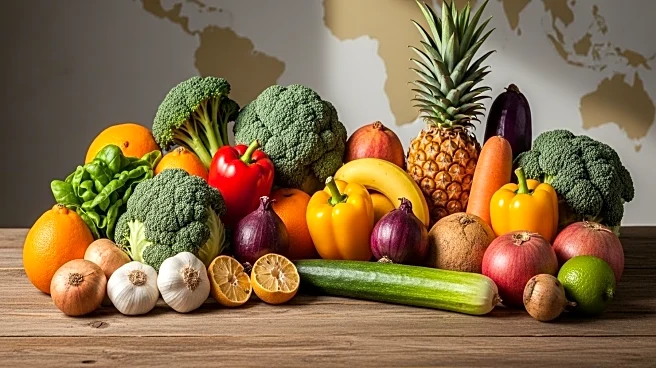What's Happening?
South Africa's agricultural export industries are facing significant challenges in accessing new markets due to complex and slow trade negotiations. Lambert Botha, a legal practitioner specializing in international trade, highlighted these issues at the MacDay 2025 event in Ballito, KwaZulu-Natal. As a member of the Southern African Customs Union (SACU), South Africa must negotiate trade agreements jointly with Botswana, Namibia, Lesotho, and Eswatini, which complicates the process. Negotiations with countries like India have been stalled since 2008 due to the need to reconcile the interests of all SACU members. Additionally, strict international rules under the World Trade Organization (WTO) require comprehensive negotiations on tariff structures and phased reductions in import levies, further delaying progress.
Why It's Important?
The slow pace of trade negotiations has significant implications for South Africa's agricultural sector, which relies heavily on exports. The inability to secure new market access can hinder growth and profitability for farmers and related industries. Certain sectors, such as motor manufacturing and textiles, are resistant to opening market access, which adds to the complexity. The agricultural industry itself is divided, with some sub-sectors eager to open markets while others are defensive against imports. This situation underscores the need for organized industry efforts to engage with authorities and influence policy, as governments primarily facilitate trade frameworks rather than drive them.
What's Next?
For South Africa's agricultural industry, patience and sustained pressure are essential as trade negotiations continue. Producer organizations are encouraged to step up and engage constructively with government authorities to provide policy input and help officials navigate the complex trade landscape. The stalled negotiations with India and other countries highlight the need for a strategic approach to overcome obstacles and secure market access. As South Africa remains a key player in the region, its ability to drive higher levels of trade and income will depend on effective collaboration between industry and government.
Beyond the Headlines
The drawn-out nature of trade negotiations reflects broader political and economic considerations within South Africa and the SACU. Domestic sectors with high levels of protection, such as motor manufacturing and sugar, influence the pace and direction of trade talks. Additionally, conflicting interests within agricultural value chains, such as between milk producers and processors, further complicate the process. These dynamics highlight the importance of balancing protectionist policies with the need for market expansion to ensure long-term sustainability and growth for South Africa's agricultural exports.










